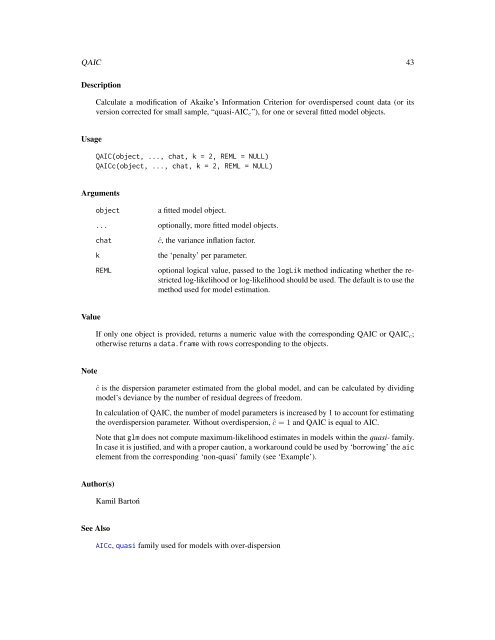Package ‘MuMIn’
Package 'MuMIn'
Package 'MuMIn'
Create successful ePaper yourself
Turn your PDF publications into a flip-book with our unique Google optimized e-Paper software.
QAIC 43<br />
Description<br />
Calculate a modification of Akaike’s Information Criterion for overdispersed count data (or its<br />
version corrected for small sample, “quasi-AIC c ”), for one or several fitted model objects.<br />
Usage<br />
QAIC(object, ..., chat, k = 2, REML = NULL)<br />
QAICc(object, ..., chat, k = 2, REML = NULL)<br />
Arguments<br />
object<br />
a fitted model object.<br />
... optionally, more fitted model objects.<br />
chat<br />
k<br />
REML<br />
ĉ, the variance inflation factor.<br />
the ‘penalty’ per parameter.<br />
optional logical value, passed to the logLik method indicating whether the restricted<br />
log-likelihood or log-likelihood should be used. The default is to use the<br />
method used for model estimation.<br />
Value<br />
If only one object is provided, returns a numeric value with the corresponding QAIC or QAIC c ;<br />
otherwise returns a data.frame with rows corresponding to the objects.<br />
Note<br />
ĉ is the dispersion parameter estimated from the global model, and can be calculated by dividing<br />
model’s deviance by the number of residual degrees of freedom.<br />
In calculation of QAIC, the number of model parameters is increased by 1 to account for estimating<br />
the overdispersion parameter. Without overdispersion, ĉ = 1 and QAIC is equal to AIC.<br />
Note that glm does not compute maximum-likelihood estimates in models within the quasi- family.<br />
In case it is justified, and with a proper caution, a workaround could be used by ‘borrowing’ the aic<br />
element from the corresponding ‘non-quasi’ family (see ‘Example’).<br />
Author(s)<br />
Kamil Bartoń<br />
See Also<br />
AICc, quasi family used for models with over-dispersion


